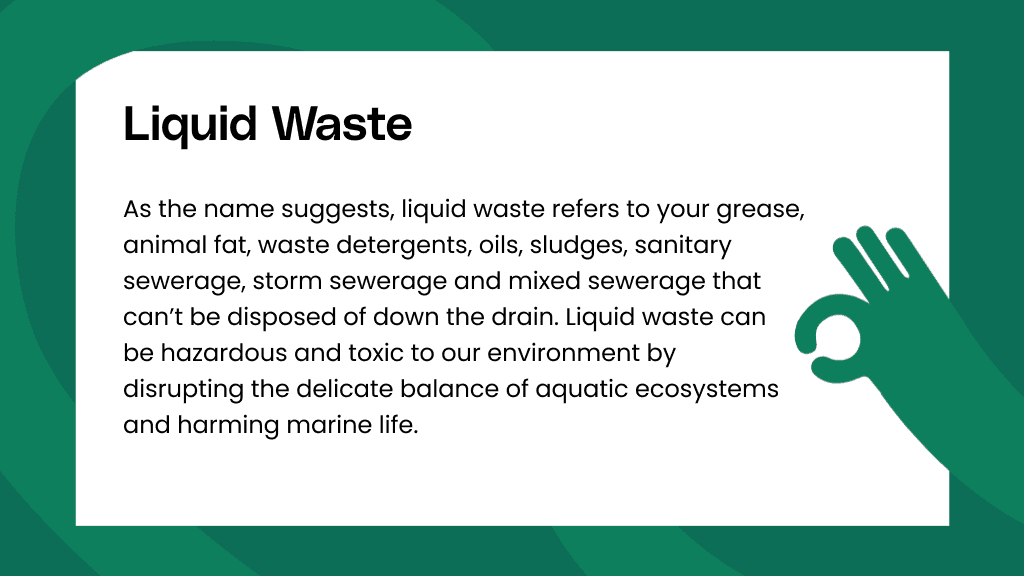What Does Reclaim Waste Mean?
What Does Reclaim Waste Mean?
Blog Article
The Only Guide to Reclaim Waste
Table of ContentsThe Facts About Reclaim Waste UncoveredThe Best Guide To Reclaim WasteThe smart Trick of Reclaim Waste That Nobody is Talking AboutReclaim Waste Can Be Fun For AnyoneGetting My Reclaim Waste To Work
Discover the types, occurrences, and types of fluid waste. Domestic sewage waste refers to the waste and items from a household septic storage tank. This kind of waste is developed by people in houses, colleges, and other structures. This only consists of septic systems that have a drain area. The proper management and disposal of domestic sewer waste call for liquid waste to be moved to a sewage therapy plant where the correct techniques and devices are used to purify and get rid of waste.
Industrial waste frequently consists of potential risks, such as combustible materials or a mixture of fluid and solid waste items, and needs an advanced and in-depth disposal procedure. The disposal of industrial waste generally entails the filtering of waste before transport to make certain risk-free and correct disposal. Hazardous waste is developed from results and runoff of commercial procedures and manufacturing.
This kind of waste can not utilize the very same sewer administration transportation or processes as septic or commercial liquids. The industrial waste management procedure requires the assessment and testing of fluid waste before it goes through the disposal procedure (industrial wastewater treatment). Runoff waste is the fluid waste that originates from runoff and excess stormwater in highly populated locations or cities
Overflow waste can create contamination and flooding if not taken care of appropriately. Discover more regarding sewer cleansing and waste management. Guaranteeing correct waste monitoring can avoid catastrophes and minimize ecological injury. Both individuals in property settings and professionals in commercial or manufacturing markets can profit from understanding the processes and regulations of fluid waste administration.
Getting The Reclaim Waste To Work
Contact PROS Services today to learn more about our waste management and disposal solutions and the appropriate means to take care of the fluid waste you produce.
(https://www.openlearning.com/u/leonaube-smse1x/about/)Do you know what takes place to your water when you draw the plug, purge the toilet or drain pipes the cleaning machine? No? Well, it deserves understanding. This supposed 'wastewater' is not just a crucial resource but, after treatment, will certainly be released to our land, waterways or the sea. Utilized water from toilets, showers, baths, kitchen sinks, washings and industrial procedures is understood as wastewater.

water made use of to cool equipment or tidy plant and tools). Stormwater, a form of wastewater, is overflow that moves from agricultural and metropolitan areas such as roof coverings, parks, yards, roadways, paths and seamless gutters right into stormwater drains, after rainfall. Stormwater streams neglected straight to local creeks or rivers, ultimately reaching the sea.
The 5-Second Trick For Reclaim Waste
In Queensland, a lot of wastewater is dealt with at sewer treatment plants. Wastewater is transferred from residential or commercial websites through a system of sewage systems and pump stations, called sewerage reticulation, to a sewer treatment plant. Local federal governments build, keep and operate most sewer therapy plants. Operators are accredited under the Environmental Management Act 1994 to discharge treated view publisher site wastewater at an acceptable ecological requirement into waterways.
The Division of Natural Resources advises local federal governments regarding managing, operating and keeping sewage systems and treatment plants. In unsewered areas, local governments might call for homeowners to mount private or home sewer therapy systems to treat residential wastewater from bathrooms, cooking areas, shower rooms and laundries. The Division of Natural Resources authorises making use of home systems when they are confirmed to be efficient.
Most stormwater obtains no treatment. In some brand-new class, treatment of some stormwater to get rid of trash, sand and gravel has begun utilizing gross toxin traps. Wastewater therapy occurs in 4 stages: Gets rid of strong matter. Bigger solids, such as plastics and various other items mistakenly released to sewers, are removed when wastewater is travelled through screens.
Makes use of little living microorganisms knows as micro-organisms to break down and get rid of remaining dissolved wastes and fine bits. Micro-organisms and wastes are incorporated in the sludge.
Getting The Reclaim Waste To Work
Nutrient elimination is not offered in all sewer therapy plants due to the fact that it calls for expensive specialised tools. It is coming to be extra typical in Queensland. Clear liquid effluent generated after treatment may still contain disease-causing micro-organisms. If this effluent is released into rivers such as rivers or the sea, the micro-organisms will at some point pass away out.

This typically implies wastewater has actually to be dealt with or contaminants eliminated before it can be discharged to waterways. The majority of wastewater flows into the sewerage system. Under the Act, local governments carry out authorizations and permits for ecologically appropriate activities (Periods) including wastewater releases that might have a neighborhood effect. The division carries out approvals and permits to Periods including wastewater launches that might have a local or statewide effect.
The smart Trick of Reclaim Waste That Nobody is Talking About
Surveillance offers factual details about water high quality and can confirm that permit problems are being fulfilled. The information obtained via surveillance provides the basis for making water top quality choices.
Report this page